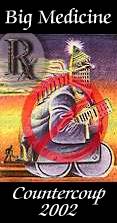Challenging Corporate Power,
Asserting the People's Rights
CORPORATE PERSONHOOD
Session III of a 10-part Online Tutorial
by the Women's International League for Peace & Freedom
If you are looking for information on corporate bodies' rise to dominant power (and what We the People can still do about it), go directly to the Women's International League for Peace & Freedom extraordinary "Challenging Corporate Power" Tutorial at http:/www.wilpf.org. All study materials are available as downloadable .pdf files, but we have converted those in the Corporate Personhood session to text for the preview below.In Session II we noted the 1886 Supreme Court decision that gave corporations the same rights and protections as human beings, and in this session we explore that phenomenon in depth. The 14th Amendment to the Constitution was ratified in 1868 in order to protect the rights of newly freed slaves. Section 1 reads as follows: All persons born or naturalized in the United States, and subject to the jurisdiction thereof, are citizens of the United States and of the State wherein they reside. No State shall make or enforce any law which shall abridge the privilege or immunities of citizens of the United States, nor shall any State deprive any person of life, liberty, or property, without due process of law; nor deny to any person within its jurisdiction the equal protection of the laws.
The U. S. Constitution and the country's legal foundations were rooted in the sanctity of property rights and the individual. So it was clear to corporate lawyers, following the burst of corporate
growth and influence during the Civil War, that it would be necessary to get the Supreme Court to declare the corporation equivalent to a "person" with the same 14th Amendment protection of
the laws. Only with this designation could the corporate form pursue growth, wealth, and power free from the restraining will of the people.
In 1936 the dean of the John Marshall Law School said,
This session explores the cultural impact of this decision. What has it meant for the role of us human persons, and the organizing of people's movements for full inclusion and personhood,
when the biggest, wealthiest, and most powerful "persons" are our own corporate creations?
READINGS:
DISCUSSION QUESTIONS
SUPPLEMENTARY MATERIALS
"The Santa Clara Blues: Corporate Personhood versus Democracy" |

